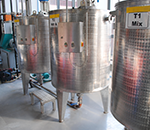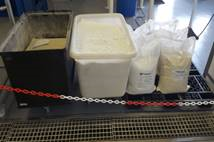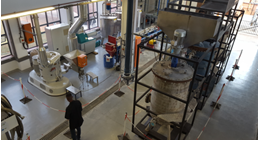Revolutionising the agricultural industry using nanotechnology
NPEP Newsletter, October 2018
 Globally, the agricultural industry is facing a myriad of challenges which include low efficiencies in nutrient use, stagnation in crop yield, multi nutrient deficiencies, climate change and water scarcity. It is imperative that many of these global challenges be addressed by innovative technologies, including the application of nanotechnology.
Globally, the agricultural industry is facing a myriad of challenges which include low efficiencies in nutrient use, stagnation in crop yield, multi nutrient deficiencies, climate change and water scarcity. It is imperative that many of these global challenges be addressed by innovative technologies, including the application of nanotechnology.
Nanotechnology applied in the agricultural industry could increase the quality and yields of crops, reduce pollution and protect foodstuff after harvesting, resulting in a potential growth of 30% in the industry.
So what are some of the applications of nanotechnology in agriculture?
Starting at the planting stage, the efficient use of fertilisers and pesticides can be improved by the use of nanoscale carriers and compounds, reducing the amount of fertiliser applied without impairing productivity. Applications that are already in the market globally include nano encapsulated agrochemicals or nutrients, antimicrobial nanoparticles, and active food packaging. In China, for example, products such as nano synergism fertiliser, nano 863, tombarthite nano thin film light spraying fertiliser and nano zinc oxide fungicides are already widely used. Apart from these applications, research and development is ongoing in a number of areas ranging from the use of biodegradable polymer nano-composites as mulch films with enhanced performance (e.g. the use of nano-scale layered double hydroxide to prevent leaching of UV stabilisers in mulch films), to nano-sensors for soil condition monitoring.
Benefits of nanotechnology in agriculture
Application of nanotechnology in agriculture can potentially bring many benefits, leading to increased food security. These include:
- Increased plant germination, growth, yield and quality
- Enhanced storage period for vegetables and fruits
- Improved animal immunity leading to decreased antibiotic use.
- Enhanced pesticide performance and control efficacies, at reduced costs
- Enhanced efficiency of fertilisers
- Rapid detection and diagnosis of disease, and improved ability of plants to absorb nutrients and promote molecular treatment of diseases.
Nanomaterials Industrial Development Facility (NIDF)
In order to remain competitive in the global economy, the Council for Scientific and Industrial Research (CSIR) and the Department of Science and Technology (DST) have established the Nanomaterials Industrial Development Facility (NIDF) to enable the industry, research entities and small, medium and microenterprises to develop and scale up nanomaterials and nano enabled technologies, in partnership. One current project involves the development of nanoparticles for application in fertiliser production. In another project, the CSIR produces polymers with nanoparticles for nano enhanced plastics for food packaging. The NIDF is aware that nanotechnology and particularly the use of nanostructures in products is something new to the South African industry. For that reason they also assist users to identify and mitigate potential health and safety aspects of a particular nanotechnology through collaborative efforts with local universities. Being part of the DST-CSIR National Centre for Nanostructured Materials, the NIDF has established a Safety, Health and Environmental system that plays a critical role in identifying and successfully managing these issues.


CSIR’s Nanomaterials Industrial Development Facility
10 Year Celebrations of the DST Nanotechnology Innovation Centres
Revolutionising the agricultural industry using nanotechnology
Health and safety concerns of agricultural nanotechnology
Commercial applications of nanotechnology in the agricultural sector
The safe and responsible development of nanotechnology in South Africa
Nanotechnologies in animal production and animal health care
Applied Nanotechnology and Nanoscience International Conference – ANNIC 2018
Third International Conference on Composites, Biocomposites and Nanocomposites
